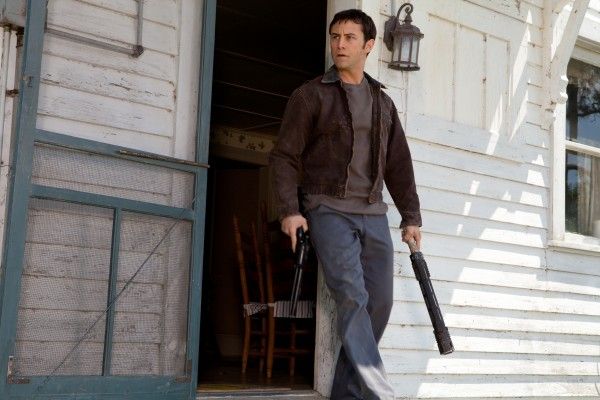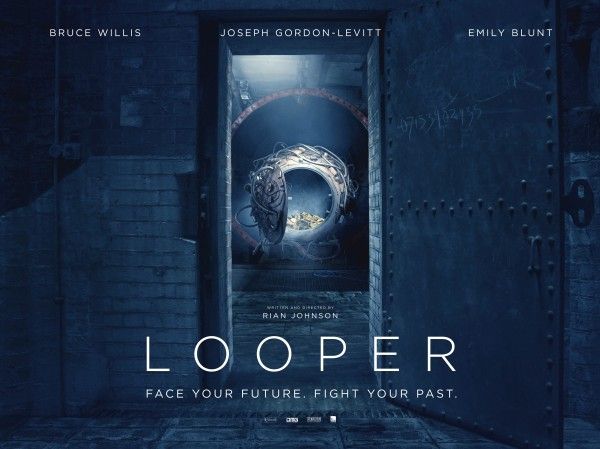We often hear of Hollywood films having to be cut and/or censored in order to be shown in more lucrative international markets, but in the case of Rian Johnson’s upcoming sci-fi film Looper, scenes are actually being put back into the movie for its Chinese release. The film takes place in a future where time travel exists, but is only used on the black market. When the mob wants to kill someone, they send the target 30 years into the past where a contract killer (Joseph Gordon-Levitt) does the dirty work. Things are going smoothly until Gordon-Levitt’s future self (Bruce Willis) is sent into the past to be killed.Johnson’s original script apparently had quite a few scenes set in Paris, but the location was changed to Shanghai in order to entice Chinese entity DMG, who ended up providing some financing for the film. Now Shanghai-set scenes left on the cutting room floor are being reinserted into Looper for its release in China. Hit the jump for more. Per the LA Times, Johnson’s American theatrical cut of Looper excludes a few expositional scenes about how Gordon-Levitt’s character takes a downward spiral. The scenes in question showcase Shanghai streets and landmarks, but didn’t test well for American audiences as some felt it upset the film’s pacing. In a not-so-eloquent quote from someone involved with the film, “the Chinese didn’t care about pacing, and they wanted the [China-set] scenes in, so we said OK."There’s not really a big issue here since no one’s going back and filming scenes specifically for Chinese audiences, but putting the cut scenes back into the film for the Chinese release isn’t dissimilar to a rock band yelling out the name of the city they’re in over and over again during a concert for easy applause.That said, the movie business is becoming increasingly tied to international audiences—specifically China. Films make a great deal of money overseas, so for some major releases a film's international appeal is being taken under consideration throughout a film's development. The Red Dawn remake was significantly (and offensively) altered when MGM concluded that China posed a lucrative box office possibility. After filming had completed, the studio decided to digitally change the film’s villains from Chinese to North Koreans by altering the antagonists’ uniforms and flags. Essentially, MGM loudly proclaimed, “all Asians look alike.â€Johnson has too much artistic integrity to have ever made significant changes in order to appease an international backer, but it becomes a slippery slope when dealing with filmmakers who have less pride in the artistic vision of their script.
Per the LA Times, Johnson’s American theatrical cut of Looper excludes a few expositional scenes about how Gordon-Levitt’s character takes a downward spiral. The scenes in question showcase Shanghai streets and landmarks, but didn’t test well for American audiences as some felt it upset the film’s pacing. In a not-so-eloquent quote from someone involved with the film, “the Chinese didn’t care about pacing, and they wanted the [China-set] scenes in, so we said OK."There’s not really a big issue here since no one’s going back and filming scenes specifically for Chinese audiences, but putting the cut scenes back into the film for the Chinese release isn’t dissimilar to a rock band yelling out the name of the city they’re in over and over again during a concert for easy applause.That said, the movie business is becoming increasingly tied to international audiences—specifically China. Films make a great deal of money overseas, so for some major releases a film's international appeal is being taken under consideration throughout a film's development. The Red Dawn remake was significantly (and offensively) altered when MGM concluded that China posed a lucrative box office possibility. After filming had completed, the studio decided to digitally change the film’s villains from Chinese to North Koreans by altering the antagonists’ uniforms and flags. Essentially, MGM loudly proclaimed, “all Asians look alike.â€Johnson has too much artistic integrity to have ever made significant changes in order to appease an international backer, but it becomes a slippery slope when dealing with filmmakers who have less pride in the artistic vision of their script.

